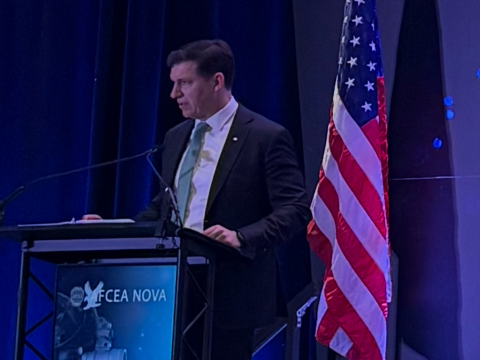Incoming: U.S. Global Engagement Is Not Optional
While I understand the appeal of focusing on domestic problems, I believe a further overseas reduction is not an option. Deployed forces remain critical to security and national economic interests.
Since World War II, the U.S. military largely has borne the cost of preserving peace around the globe, which also has helped secure homeland prosperity. Boots on the ground in foreign lands have allowed us to form strong economic ties with our allies, establish a presence in critical regions and fight “over there” should a conflict arise. We adopted this strategy in the years following World War II and accepted its cost as the price of being a world leader. That strategy frequently has been under fire, with many calling for more reductions in our overseas presence to focus on problems at home.
While I understand the appeal of focusing on domestic problems, I believe a further overseas reduction is not an option. Deployed forces remain critical to security and national economic interests. However, budgetary challenges at home and a high number of regional conflicts mean we need to augment our diminished military presence abroad with other elements of national power and adopt a “whole of government” approach.
According to a January Hoover Institution paper titled “The Decline of American Engagement: Patterns in U.S. Troop Deployments,” the United States has about 1.3 million men and women in uniform today, compared with about 3 million in 1970. Before the Berlin Wall fell in late 1989, almost 300,000 U.S. troops were in Europe. Today that number is less than 64,000. During the same period, more than 103,000 U.S. troops were in the Pacific. That number now stands at about 77,000. Some undesired consequences have occurred as a result.
Russia’s early 2014 aggressive push into Ukraine led to fighting that continues today, raising tensions with the West. Many NATO nations, including the United States, enjoyed a peace dividend following the fall of the Soviet Union, but new angst about the resurgent Russian threat has led some European nations to reassess their defense spending. Additionally, two former Soviet bloc countries, Romania and Poland, decided to host a U.S.-deployed missile defense system despite Russian objections.
In Turkey, the attempted military coup took the world by surprise. President Recep Tayyip Erdogan used the failure as an opportunity to purge many of his enemies, causing some to question his support for democracy. Now we learn Turkey may grant Russia access to NATO’s Incirlik Air Base for ISIS strike operations in Syria. These actions by a long-term ally are cause for concern.
In Asia, the republics of Korea and Japan are concerned about North Korea’s nuclear weapons program and Kim Jong-Un’s steadfast intention to develop an intercontinental missile. From South America, drug trafficking cartels threaten a growing segment of the U.S. population physically, economically and socially through addiction. In Africa, terrorist groups such as Boko Haram remain committed to the extinction of Western principles and the establishment of a radical Islamic government through jihad. They employ horrendous acts of indiscriminate killing and kidnappings to achieve their objectives.
The upshot is that we live in a very dangerous world where the United States’ leadership role and its global interests are challenged regularly. While we cannot—and should not—be the world’s policeman, we must continue to assess and address global events that threaten our vital national interests.
For starters, we should improve our indications and warning posture. We cannot afford to be surprised by world events. We need greater investment in our human intelligence (HUMINT) programs to complement other intelligence disciplines. We need a tighter relationship among the State Department and other federal departments, such as Defense, Commerce, Treasury and Justice. I suggest creating a cross-agency, rank-and-file group from these organizations aligned under the State Department. When international events occur that warrant U.S. attention, this body could help develop options for our decision makers to consider.
We also need to optimize the use of our economic foreign assistance programs. In 2015, broadly defined foreign assistance amounted to roughly $49 billion, according to a report by the Congressional Research Service. I would like to see the United States make much greater use of soft power, such as information. Telling our story of freedom and democracy, exposing human rights violations and providing an alternative narrative to our adversaries’ propaganda will help strengthen the U.S. global leadership posture and influence the thinking and behavior of other global actors. Finally, we should expand our military foreign training and sales programs to help our allies better prepare to fill the voids left by our reduced military presence.
Domestic issues such as health care, job creation and homeland security have replaced talk about oil and Middle East peace. While these issues are critical, the United States cannot abandon its global leadership responsibilities and return to a period of isolationism. The consequences would prove even more costly for the country. To maintain peace and prosperity, the United States needs a balanced approach to foreign and domestic issues. With our reduction in forward-deployed troops, we need new capabilities and strategies from across the expanse of our government to accomplish the job.
Lt. Gen. Mike Basla, USAF (Ret.), the former chief of information dominance and chief information officer of the U.S. Air Force, is a senior vice president and Air Force client executive for CACI. The views expressed here are his alone.




Comments